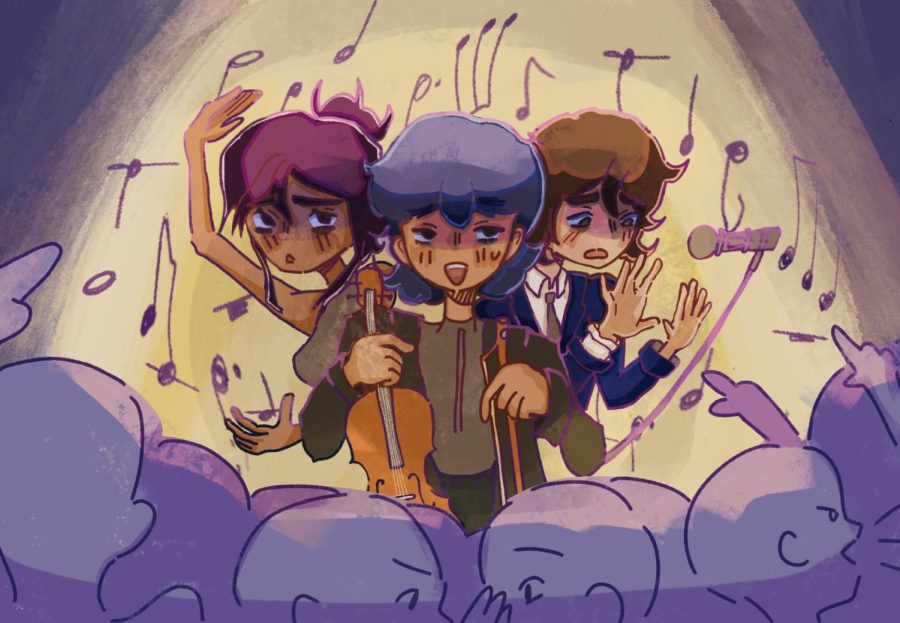Pressure in the Performing Arts: How students experience perfectionism
LIVE FOR THE APPLAUSE: Artists stress over aspirations, projecting them onto the audience and each other while reaching for the “flawless” performance.
March 14, 2023
Violins aren’t the only thing a director should worry about being high-strung. Awaiting concerts and showcases, the performers at Northwood often bend to the will of looming expectations. Students have to “face the music,” but the truth is the pressure lives in their heads.
Between constantly assessing their skill and worrying too much about their individual ability, an artist’s doubts and worries can amalgamate into performance anxiety. This term may sound familiar to athletes that have experienced stress before big games, and it is similarly experienced but has a different cause.
“In band practice you’re doing the same thing over and over again to perfect it, so there’s less stress when it comes to knowing what to do and more for doing it right,” said band member and student athlete sophomore Ayu Hayashi. “But when we practice for sports it’s with drills, and it can be harder to predict what will happen depending on the team.”
It can be particularly aggravating to artists when they mess up in something that they have practiced a hundred times before or have previously played right. For some performers, perfectionism runs deep, and so do their feelings of incompetence.
The culture is uplifting in Northwood’s performing arts community, but students are unable to benefit from this attitude when too involved with their own craft. There can be instances when fellow performers, who like them are hoping for the best of the ensemble, are perceived as superior models to constantly aspire to match up to.
“When I see others excelling at such a fast rate I feel a little like I’m being dragged behind,” Chamber Singers junior Olivia James said. “Not because of the person saying anything, it’s just the feeling of not being good enough. Like I could never achieve as much as they achieve.”
There’s nothing wrong with having a desire to succeed—in fact, it’s healthy. Being motivated within yourself can lead to great things. However, a problem arises when combining that with the freeing nature of art and especially arts classes.
Performance art at its core is an outlet for connection and escape from the mundanity of life. It can be a soothing way to destress when faced with a hard day in academics. Straining towards perfection and the extraordinary defeats the purpose of these extracurriculars, which is to provide a community for students to freely participate and find a passion in.
“I tell all of my classes that they should constantly be failing because it shows their effort,” band director Whitney Tavlarides said. “There is no pressure to ‘succeed.’ Only pressure to grow and try. Our goal is to make students human, not to make our students professionals.”
Knowing your limits and sticking to what you most enjoy in music are some of the best ways to move towards that growth in the performing arts. This could be through relying on community and engaging with your peers, or in general reevaluating how you see the arts.
“I always try to remind my students, ‘run your own race,’” counselor Kelsey Loup said. “If the magic is in you, the magic will be wherever you go. The biggest thing is to focus on you.”
This applies to performance as well. It’s impossible to control each note and movement you make. While there’s enjoyment in playing well, there’s also nothing wrong with finding value in your art for its basic purpose—that is, something made for enjoyment. Why not be the person to enjoy it, mistakes and all?
Don’t let your drive to succeed put out your original spark with the arts. It’s most important that each individual in a dance, song or scene feels freedom for expression and a space to evolve.
“It’s important to know you can move at your own pace because it gives you more control,” student dancer and theater member Areesha Suhail said. “You can start to think of your successes as big successes. If you’re perfect, you don’t learn.”



![AAAAAND ANOTHER THING: [CENSORED] [REDACTED] [BABY SCREAMING] [SIRENS] [SILENCE].](https://thehowleronline.org/wp-content/uploads/2025/06/lucy-1200x800.jpg)


















































![AAAAAND ANOTHER THING: [CENSORED] [REDACTED] [BABY SCREAMING] [SIRENS] [SILENCE].](https://thehowleronline.org/wp-content/uploads/2025/06/lucy-300x200.jpg)




Tina
Mar 14, 2023 at 4:14 pm
Very well written 🙂